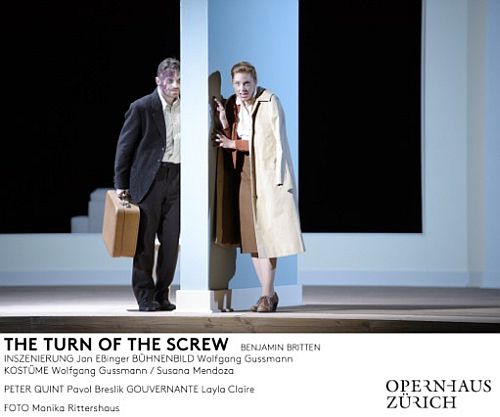 Switzerland Britten: The Turn of the Screw Soloists, Philharmonia Zurich conductor Constantin Trinks, Zurich Opera 7.11.14 (JR)
Switzerland Britten: The Turn of the Screw Soloists, Philharmonia Zurich conductor Constantin Trinks, Zurich Opera 7.11.14 (JR)
Cast:
Governess: Layla Claire
Miles: Tom Deazley
Flora: Tabitha Tucker
Mrs. Grose: Hedwig Fassbender
The Prologue and
Peter Quint: Pavol Breslik
Miss Jessel: Giselle Allen
Production:
Director: Jan Essinger (following a concept by Willy Decker)
Set: Wolfgang Gussmann
Costumes: Wolfgang Gussmann
Susana Mendoza
Lighting: Franck Evin
Dramaturgy: Kathrin Brunner
Henry James’ chilling and ambiguous novella “The Turn of the Screw” poses more questions than supplies answers and allows the reader to consider a number of possible scenarios. Is it simply a Victorian horror story? Are Peter Quint and Mrs. Jessel simply hallucinations or inventions of the mind of either Miles or the Governess or both? Is the young Governess hysterical projecting her own anxieties onto her charges? Are the ghosts simply people in disguise who have abused or want to abuse the children? What is the exact nature of the evil hinted at in the story? Why does Miles fall dead when finally uttering the name of his tormentor? This all remains unresolved, in the novel and in the opera: there are no explanations, no morals, no answers, only confusion and suspense.
Willy Decker was to have directed this new production but fell ill early on, so that Zurich Opera employed one of its internal producers, Jan Essinger, to complete the task following Decker’s concept. He has done a fine job. The production updates the action to the 1950s, which is when the opera was written. The house in Bly (somewhere in Eastern England) is not a Gothic villa but quite a modern construction (without visible tower or lake): we see only part of the building, a couple of rooms which are predominantly bare, but for a bath or a piano or a desk as befits the action. One is disconcerted by never knowing whether we are looking at the inside or outside. The stage revolves much of the time, at differing speeds, sometimes imperceptibly slowly. Strong visual images are created, aided by bright lighting and the crisp period costumes.
The Governess is flawlessly sung and acted by Canadian soprano Layla Claire. I was not surprised to read in her biography that she appears to be a firm favourite with James Levine. Hedwig Fassbender’s Mrs. Grose is less complex a character and sings with admirable gusto: she has both feet on the ground whilst the Governess is full of neuroses. Tom Deazley, as Miles, started visibly and audibly nervous and his first rendering of the haunting theme in his first real solo “Malo, I would rather be” was virtually inaudible. As the evening wore on, he settled but projection remained a problem. Tabitha Tucker, as Flora, on the other hand, had no problems with projection and was clearly at home on stage. She has a strong clean bright voice, with faultless intonation. (Full disclosure here: I am a friend of her family).
Stealing the show from the Governess was Pavol Breslik as Quint (and singing the Prologue). His firm tenor was perfect for both roles and he hovered menacingly around the stage, appearing and disappearing and sending chills down the spine. Ghoulish Gothic black and red make-up and tattered clothing added to the Hammer Horror Film look, as it did for Miss Jessel (and her spooky band of punk look-a-likes): Mrs Jessel was sung by Giselle Allen, her shrill soprano very appropriate for the part. One particular moment will remain in my memory for quite a while: Miles and Flora are playing in the bath and singing “Tom, Tom, the piper’s son”, slightly off key to add to the eerie atmosphere. They get out of the bath and moments later, presumably from a trap door below the bath, arises Peter Quint, to a sharp intake of breath from the audience.
The chamber orchestra, consisting of a mere thirteen players, had their work cut out and were splendid across the board. They were justly rewarded at the end by being beckoned onto the stage to receive warm applause. Constantin Trinks conducted, clearly a lover of Britten’s music, and I was surprised to read he has never conducted Britten before. He has an audible aptitude and took care to bring out the detail of this intricate and beguiling score throughout.
The applause went on for much longer than usual, showing that the opera, the production and the singers had succeeded in making their mark. So it was sad to see many empty seats. The “Turn of the Screw” is certainly not an easy opera either to watch or listen to, certainly not a fun night out in any sense, but patience and an open mind brings a huge reward. The story and the music leave an indelible imprint. Zurich Opera is to be thanked for bringing this strong piece to the many Swiss opera-goers who had never heard (or perhaps even heard of) this marvellous work.
John Rhodes